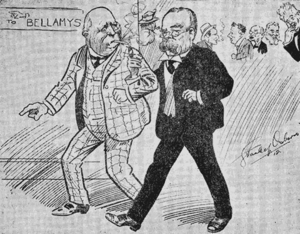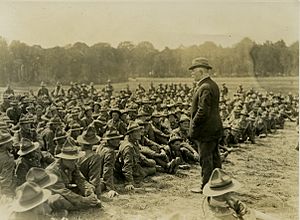William Massey facts for kids
Quick facts for kids
William Ferguson Massey
|
|
|---|---|
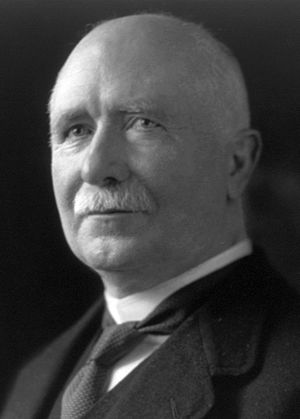
Massey in 1919
|
|
| 19th Prime Minister of New Zealand | |
| In office 10 July 1912 – 10 May 1925† |
|
| Monarch | George V |
| Governor-General | John Dickson-Poynder Arthur Foljambe John Jellicoe Charles Fergusson |
| Preceded by | Thomas Mackenzie |
| Succeeded by | Sir Francis Bell |
| 5th Leader of the Opposition | |
| In office 11 September 1903 – 10 July 1912 |
|
| Deputy | James Allen |
| Preceded by | William Russell |
| Succeeded by | Joseph Ward |
| Personal details | |
| Born | 26 March 1856 Limavady, County Londonderry, Ireland, UK |
| Died | 10 May 1925 (aged 69) Wellington, New Zealand |
| Political party | None until February 1909 Reform |
| Spouse |
Christina Allan Paul
(m. 1882) |
| Children | 7, including Walter and Jack |
| Parents | John Massey Marianne Ferguson |
| Relatives | Stan Goosman (nephew) |
William Ferguson Massey (26 March 1856 – 10 May 1925), also known as Bill Massey, was an important politician in New Zealand. He served as the 19th Prime Minister from 1912 until he died in 1925.
Massey was also the first leader of the Reform Party. This was New Zealand's second major political party, formed in 1909.
He was born in Ireland and moved to New Zealand in 1870. There, he became a farmer near Auckland, which earned him the nickname Farmer Bill. He later became a leader in farmers' groups.
Massey entered parliament in 1894. He was known for supporting farmers and for being against strong worker unions. He promised New Zealand's full support for Britain during the First World War. Massey was the second-longest serving Prime Minister of New Zealand.
Contents
Early Life and Moving to New Zealand
William Ferguson Massey was born in 1856 into a farming family. He grew up in Limavady, County Londonderry, which is now part of Northern Ireland. His parents, John and Marianne Massey, were farmers.
In 1862, his family moved to New Zealand. However, William stayed in Ireland for eight more years to finish his schooling. He lived with his grandmother and uncle, attending schools in Limavady and Derry.
He arrived in New Zealand in 1870. Massey worked as a farmhand for several years. In 1876, he bought his own farm in Mangere, south Auckland. In 1882, he married his neighbor's daughter, Christina Allan Paul. They had seven children together.
Starting in Politics
Massey became well-known in his local community. He was involved in the school board, a debating club, and farming groups. Because of this, he started to get involved in political discussions. He often spoke for rural farmers who were against the Liberal Party government.
In 1893, Massey ran for election in the Franklin area but lost. Early in 1894, he won a special election (called a by-election) in the nearby Waitemata area. In the 1896 election, he successfully ran for the Franklin area again. He continued to represent Franklin until his death in 1925.
Becoming Leader of the Opposition
| New Zealand Parliament | ||||
| Years | Term | Electorate | Party | |
| 1894–1896 | 12th | Waitemata | Independent | |
| 1896–1899 | 13th | Franklin | Independent | |
| 1899–1902 | 14th | Franklin | Independent | |
| 1902–1905 | 15th | Franklin | Independent | |
| 1905–1908 | 16th | Franklin | Independent | |
| 1908–1909 | 17th | Franklin | Independent | |
| 1909–1911 | Changed allegiance to: | Reform | ||
| 1911–1914 | 18th | Franklin | Reform | |
| 1914–1919 | 19th | Franklin | Reform | |
| 1919–1922 | 20th | Franklin | Reform | |
| 1922–1925 | 21st | Franklin | Reform | |
Massey joined other independent Members of Parliament (MPs) who were against the Liberal Party. At first, these MPs were not well-organized. Massey helped bring more energy to this group. He became the "opposition whip," which meant he helped keep the opposition MPs working together.
After the 1899 election, the opposition group lost many seats. For over two years, they didn't have a clear leader. Massey, as chief whip, unofficially led the group. In September 1903, he officially became the Leader of the Opposition.
When Richard Seddon, the Liberal leader, died, Joseph Ward took over. Ward's leadership was not as strong, which gave Massey more chances to criticize the government. Massey often claimed there was unfairness in the government. His conservative ideas also gained support when people worried about strong worker unions and the idea of socialism.
Forming the Reform Party
In February 1909, Massey announced the creation of the Reform Party. He would lead this new party, supported by his conservative colleagues.
In the 1911 election, the Reform Party won more seats than the Liberal Party. However, they did not win enough seats to have a clear majority. The Liberals stayed in power for another year with help from independent MPs. But in 1912, they lost a vote of confidence, meaning they no longer had enough support to govern.
Serving as Prime Minister
William Massey became the Prime Minister on 10 July 1912. Soon after, he faced challenges from worker strikes. He responded strongly to strikes by miners and waterfront workers in 1912 and 1913. This made him unpopular with many workers. However, many conservative people supported him, believing his actions were necessary to keep order.
One of the first laws Massey's government passed allowed about 13,000 farmers who rented land from the government to buy their own farms.
The First World War
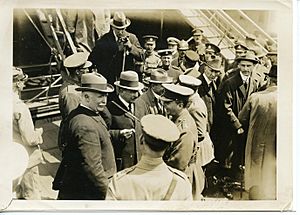
The start of the First World War in 1914 changed everything. The 1914 election resulted in a tie in parliament. Neither Massey nor his opponents had enough support to govern alone. So, Massey reluctantly invited Joseph Ward of the Liberal Party to form a special government for wartime, which began in 1915. Massey remained Prime Minister, but Ward shared leadership.
Massey and Ward traveled to Britain several times during and after the war. They discussed how New Zealand could help in the war and later, how to make peace. During his first visit, Massey met New Zealand soldiers. He listened to their complaints and showed sympathy, which upset some military leaders.
The war strengthened Massey's strong belief in the British Empire. He attended the Paris Peace Conference in 1919. There, he signed the Treaty of Versailles on behalf of New Zealand. He received honors from the King of Belgium and the President of France for his work.
Working with the Liberals
By the end of the war, the special coalition government was becoming unpopular. Massey was especially concerned about the growing influence of the Labour Party. He also faced criticism from within his own party.
In 1919, he ended the coalition government. He then campaigned for election on ideas like patriotism, stability, supporting farmers, and building public works. He successfully won a clear majority in that election.
Immigration Policies
In 1920, Massey's government passed a law called the Immigration Restriction Amendment Act. This law made it harder for people who were not from Britain or Ireland to move to New Zealand. They had to apply in writing for permission to enter the country. The Minister of Customs could decide if an applicant was "suitable."
Prime Minister William Massey stated that this law was because "a huge majority of the people of this country" wanted New Zealand to be a "white" country.
The Red Scare and Communism
Massey was known for being strongly against Bolshevik and Soviet ideas. He disliked socialist groups in New Zealand, such as the "Red Feds" and the New Zealand Labour Party. As Prime Minister, Massey was against Communist influence. He saw events like the "Red Terror" in the Soviet Union as proof that socialism was oppressive.
Because of these fears, the government passed the War Regulations Continuance Act. This law kept wartime emergency rules, including censorship. It led to a ban on Communist books and writings, which lasted until 1935.
The 1922 Election and Later Life
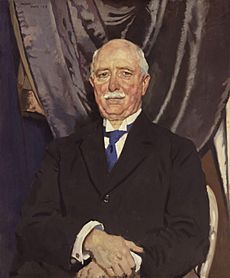
Economic problems caused support for the Reform Party to drop. In the 1922 election, Massey lost his clear majority. He had to work with independent MPs to keep his government in power. He was also worried by the success of the Labour Party, which was gaining strength.
In 1924, Massey became very ill with cancer. He had to give up many of his official duties. He died the following year, in 1925. The Massey Memorial was built in Wellington as his burial place, paid for mostly by public donations. Massey University is named after him because the university focused on agricultural science, which matched Massey's farming background.
Honours and Family
 France:
France:  Grand Officer of the Legion of Honour
Grand Officer of the Legion of Honour Belgium: Grand Officer of the Order of the Crown
Belgium: Grand Officer of the Order of the Crown
Massey's wife, Christina, received a special honor (the GBE) in 1926, a year after he died.
Two of his sons also became Members of Parliament for the Reform Party:
- Jack (1885–1964) represented his father's Franklin area from 1928 to 1935. He later served for the National Party from 1938 to 1957.
- Walter William (1882–1959) represented the Hauraki area from 1931 to 1935.
His son Frank George Massey (1887–1975) fought in World War I. He became a Major and commanded a battalion.
Images for kids
See also
 In Spanish: William Massey para niños
In Spanish: William Massey para niños
 | Jackie Robinson |
 | Jack Johnson |
 | Althea Gibson |
 | Arthur Ashe |
 | Muhammad Ali |


